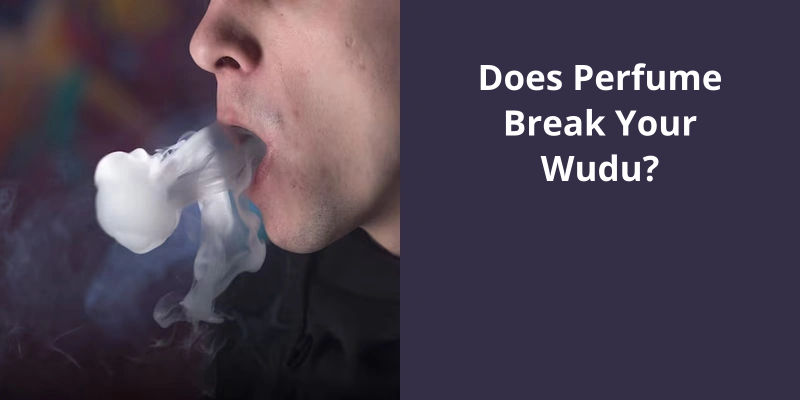Perfume is an integral part of our daily grooming routines. It helps us to smell good, feel confident, and make lasting impressions. However, have you ever wondered if it’s possible to become immune to perfume? Several factors can influence our ability to perceive fragrances, including genetics, age, and exposure levels. While it may seem like a desirable outcome to be immune to overpowering scents, there’s more to this phenomenon than meets the eye.

Is My Perfume Too Strong if I Can Smell It on Myself?
When it comes to scent, it’s easy to get lost in the allure of a fragrance and start layering it on without a second thought. However, as with many things in life, too much of a good thing can quickly turn sour. If youre smelling your perfume on yourself constantly throughout the day, it’s likely that youve over-applied and it may be too strong for those around you.
One important thing to keep in mind when it comes to fragrance is that everyones sense of smell is different. What smells overpowering to one person may barely register to another. This means that it’s important to consider not just your own experience of the scent, but also how it may affect those around you. If youre getting comments from others that your perfume is too strong, it’s likely time to dial it back a bit.
It’s also worth noting that certain types of fragrances may be more prone to becoming overwhelming than others. Heavy, musky scents, for example, can quickly become overpowering if applied too heavily. Conversely, lighter, fresher scents may be more forgiving when it comes to over-application. So, if youre finding that your fragrance is consistently too strong, it may be worth experimenting with different types of scents to find one that works better for you.
Ultimately, the goal should be to strike a balance with your fragrance. You want to be able to smell it throughout the day (its why you wore it in the first place, after all), but you don’t want it to be so strong that it becomes obnoxious or distracting to those around you. If youre finding that youre smelling your perfume non-stop, it may be time to cut back a bit and re-evaluate your application technique.
Finally, it’s worth remembering that scent is a personal choice, and what works for you may not work for everyone. If you love a particular fragrance and it makes you feel confident and happy, by all means, wear it with pride (just be sure to apply it in moderation!). At the end of the day, the most important thing is to feel good in your own skin and to wear whatever makes you feel your best.
The Benefits of Using Natural and Organic Fragrances
- Natural and organic fragrances are gentle on the skin
- They don’t contain harmful chemicals or synthetic ingredients
- They’re eco-friendly and sustainable
- They’re often cruelty-free and not tested on animals
- They offer a variety of scents and aromas from true natural sources
- They can have therapeutic properties and may improve mood and well-being
It’s a common experience for perfume wearers – you apply your favorite scent in the morning, but by the afternoon, you can no longer detect it. So why does this happen? It’s not due to an issue with the perfume itself, but something called fragrance fatigue, which is your body’s natural response to repeated exposure to the same scent. Let’s take a closer look at why this occurs and what you can do about it.
Why Do I Stop Smelling My Perfume After a While?
This is why you may also stop noticing other scents around you, such as the smell of your house or workplace. Your brain simply filters out familiar scents to make room for new ones. However, fragrance fatigue can vary based on individual factors, such as the potency of the fragrance and how frequently it’s worn.
These are the cells in your nose that detect scent molecules. When exposed to a scent for an extended period of time, the receptors can become less responsive, thus reducing your ability to detect the fragrance. This is similar to how your taste buds can become less sensitive to certain flavors if you eat the same food repeatedly.
If you were to step away from the scent for a period of time and then return to it, you’d likely be able to detect it again. This is why it’s a good idea to periodically reapply your perfume throughout the day, especially if you want to maintain a consistent scent.
Additionally, environmental factors can impact your ability to detect fragrance. Humidity, temperature, and even the pH of your skin can all affect how a fragrance smells and how long it lasts. This is why a perfume that smells great on someone else may not have the same effect on you.
Your body simply becomes desensitized to scents over time in order to adapt to new smells. Ultimately, it’s important to enjoy the fragrance you wear, whether you can detect it all day or just for a short period of time.
While the sense of smell can bring joy and pleasure, it can also be a bit perplexing. For example, have you ever put on your favorite perfume and wondered if anyone else could actually smell it on you? It turns out that the way we perceive smells can be deceiving, and there are a few factors that come into play. In this article, we’ll explore the question of whether other people can smell your perfume more than you can and dive into some fascinating insights about the science of olfactory receptors.
Can Other People Smell My Perfume More Than Me?
One common question regarding perfumes is whether other people can smell it more than the person wearing it. This is because of how the nose works. When you first apply perfume, your nose registers the scent, but it gets desensitized to the smell after a while. This is called olfactory fatigue, and it’s the reason why you might not smell your own perfume after some time.
To prevent this from happening, perfume shops offer coffee beans to smell in between different scents. The coffee beans “reset” the nose and allow it to detect new smells. However, this technique isn’t foolproof, and some people might still experience olfactory fatigue even after smelling coffee beans.
It’s also crucial not to overspray your perfume, as this can be overwhelming for people around you. A good rule of thumb is to apply perfume to your pulse points (wrists, neck, and behind the ears) and let it naturally diffuse throughout the day. This way, youll still smell great, but you won’t overpower other peoples senses.
Remember that everyones sense of smell is different, so what might smell great to you might be too strong for someone else. By following these tips, you can ensure that you smell great without overwhelming those around you.
The Science Behind Why Certain Scents Evoke Specific Emotions or Memories
The sense of smell has a strong connection to the emotional and memory centers of the brain. This is because the olfactory system is closely linked to the amygdala and the hippocampus, which are responsible for emotions and memories. The brain forms associations between certain scents and experiences, which can result in these scents evoking specific emotions or memories.
Conclusion
In conclusion, while immunity to perfume may not be achievable in the traditional sense of the word, our sense receptors can certainly become desensitized to the scent over time. This phenomenon often leads to an overuse of perfume, which isn’t only unnecessary but can also be overwhelming for others around us. Therefore, it’s important to use perfume in moderation and understand that less is often more when it comes to fragrance.





